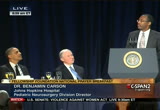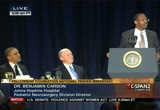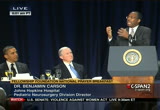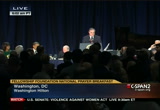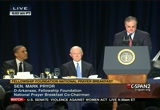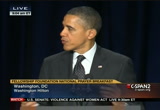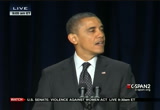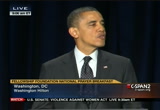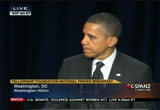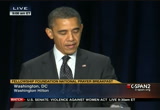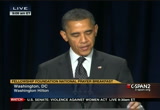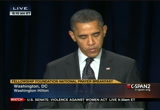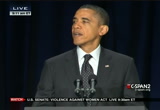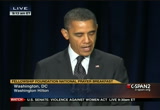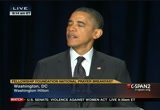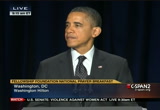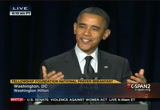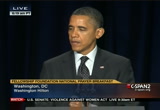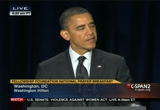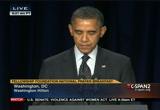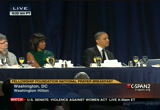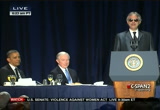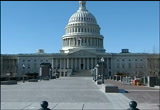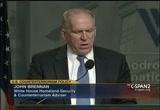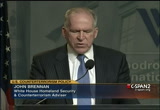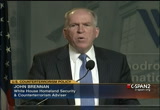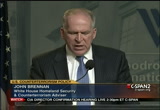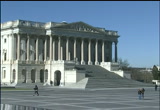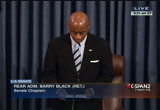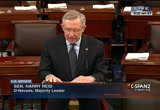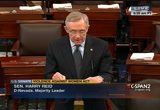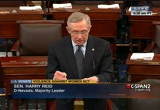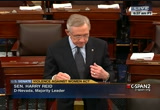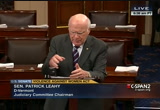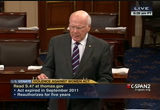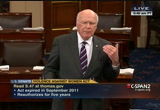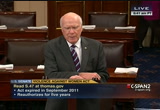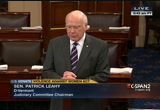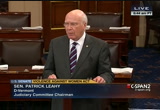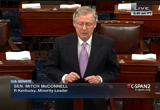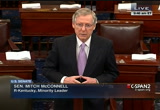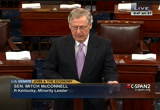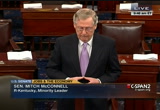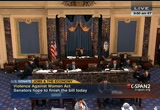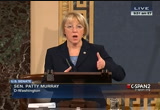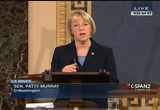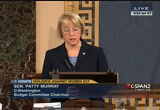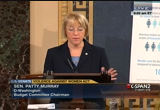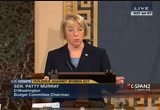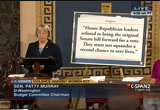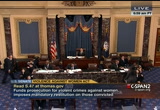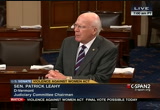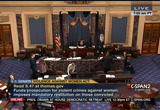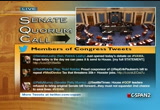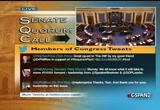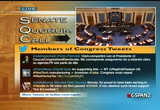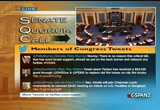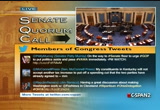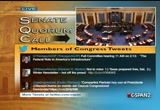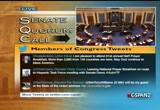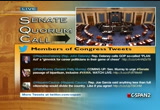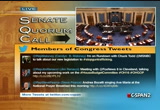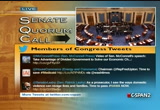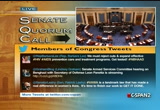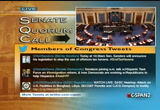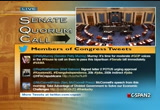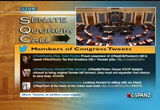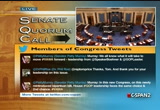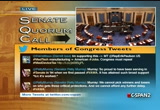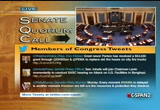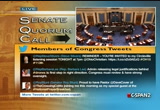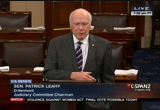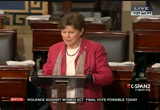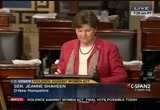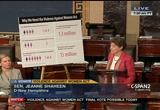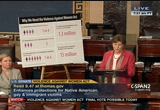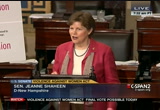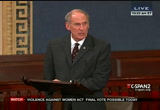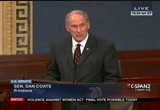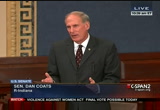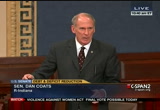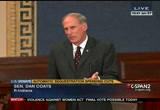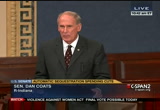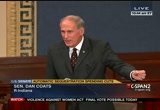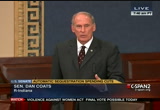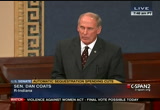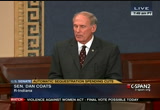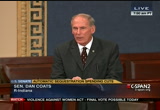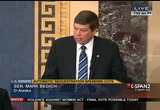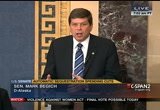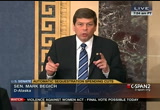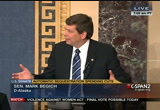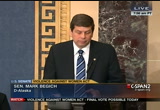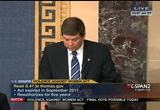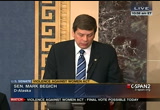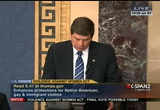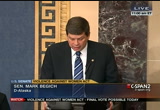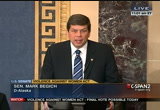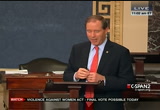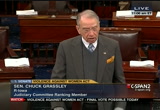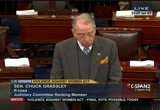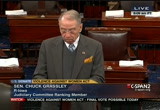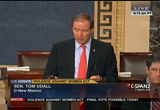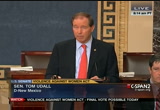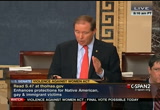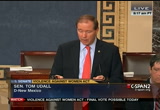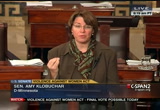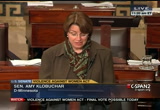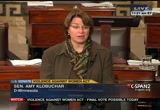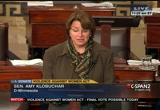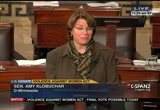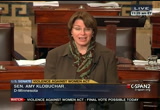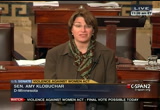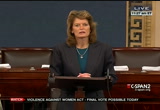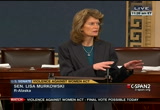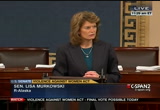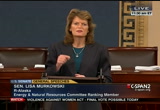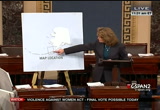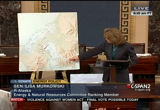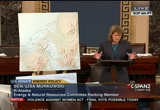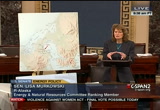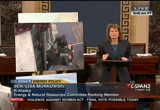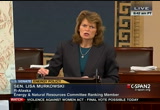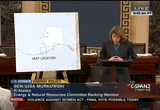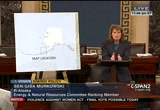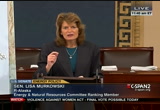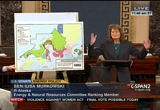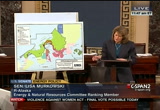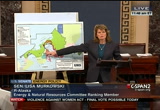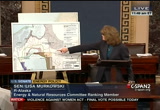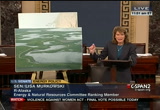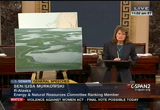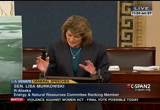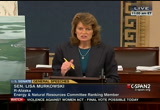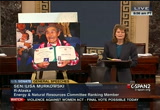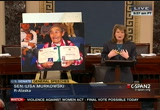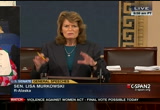tv U.S. Senate CSPAN February 7, 2013 9:00am-12:00pm EST
9:00 am
the british, who are now our good friends, thought that we were young whippersnappers and it was time for us to become a colony again. they were winning that war, marching up the eastern seaboard destroys city after city, destroyed washington, d.c., burned down the white house. next stop, baltimore but as they came into the chesapeake bay, the armada of ships, warships a source of the eye could see, it was looking grim. fort mchenry standing right there. general armistead who was in charge of fort mchenry had a large american flag commission to fly in front of the fort. the admiral in charge of the british fleet was offended and said take that flag down. you have until dusk until you take that flag and but if you don't we will reduce you to ashes. there was a young amateur poet on board by the name of francis scott key, sent by president
9:01 am
madison to try to obtain the release of an american physician who was being held captive. he overheard the british plans they were not going to let them off the ship. he mourned as dusk approached. he more for his fledgling young nation. and as the sun set, then bartman's, missiles, so much debris, he strained trying to see was the flag still there? he couldn't see a thing. all night long a continued. at the crack of dawn he ran out to the banister. he looked, straining his eyes but all he could see with dust and debris. then there was a clearing, and he beheld the most beautiful sight he had ever seen. the torn and tattered stars and stripes still waiting. and many historians said that was the turning point in the war of 1812. we went on to win that war and to retain our freedom but and if you go into the grounds of fort
9:02 am
mchenry, that victimhood is seen at the base of that flag, the bodies of soldiers who took turns propping up that flag. they would not let that flag go down because they believed. in what that flag symbolize. and what did it symbolize? one nation under god, indivisible, with liberty and justice for all. thank you. god bless you. [applause] >> thank you, doctor carson.
9:03 am
it is now my great honor to introduce our president. one of the striking measures of the passage of time, since you for sure with us, mr. president, is the comparison photographs of your daughter's at your first inauguration and your second. you have a beautiful and wonderful family. [applause] >> they remind us of the core american values of faith, family, and optimism in the future. mr. president, we want to express our love and respect to you this morning. you carry burdens none of us in this room can imagine. thank you for keeping the unbroken commitment of 10 former presidents to join us for breakfast in prayer. ladies and gentlemen, the president of the united states, barack obama. [applause]
9:04 am
>> thank you. thank you so much. thank you. thank you very much. please, have a seat. mark, thank you for the introduction. i thought he was going to talk about my gray hair. [laughter] than it is true that my daughters are gorgeous. that's because my wife is gorgeous. [applause] and my goal is to improve my gene pool. to mark and jeff, thank you for your wonderful work on behalf of this breakfast, to all of those who have worked so hard to put this together, to the heads of states, members of congress, and my cabinet, religious leaders,
9:05 am
distinguished guests who are outstanding, speaker, who have journeyed to our capital. michelle and i are truly honored to be with you this morning. but before i begin, i hope people don't mind me taking a moment of personal privilege. i want to say a quick word about a close friend of mine and yours, joshua dubois your now, some of you may not know joshua, but josh was been at my side in work and prayer for years now. he is a young reverend, wising years. is worked on my staff dickies done an outstanding job as the head of our faith-based office. every morning he sends me, the e-mail, a daily meditation.
9:06 am
snippet of scripture for me to reflect on. and it has meant the world to me. and despite my pleas, tomorrow will be his last day in the white house. so this morning i want to publicly thank joshua for all that he is done, and i know that everybody joins me in wishing him all the best in his future endeavors, including getting married. [applause] >> it says something about us as a nation and as a people that every year for 61 years now, this great prayerful addition has endured. it says something about a that every year in times of triumph end in tragedy, in calm and in crisis, we come together, not as democrats or republicans, as brothers and sisters, and as
9:07 am
children of god. every year in the midst of all our busy and ordinary lives, we set aside one morning together as one community, united in prayer. we do so because we are a nation ever humbled by our history. and we are ever attempted to our imperfections, particularly the imperfections of our president. we come together because we are a people of faith. we know that faith is something that must be cultivated. faith is not a possession. faith is a process. i was struck by the passage that was read earlier from the book of hebrews, without faith it is
9:08 am
impossible to please god because anyone who comes to him must believe that he exists and he rewards those who diligently seek him. he rewards those who diligently seek him. not just for one moment or one day, but for every moment and every day. as christians, we place our faith in the nail scarred hands of jesus christ, but so many other americans also note the close embrace of faith, muslims and jews, hindus, sikhs, and all americans, whether religious or secular have a deep abiding faith in this nation. recently i had an occasion to reflect on the power of faith a few weeks ago during the inauguration. i was blessed to place my hand
9:09 am
on the bibles of two great americans. two men whose faith still echo today. one was the bible owned by president abraham lincoln, and the other, the bible owned by dr. martin luther king, jr. as i prepared to take the sacred oath, i thought about these two men. i thought of how the times of joy and pain and uncertainty, they turned their bibles to seek the wisdom of god's words. and thought of how for as long as we've been a nation, so many of our leaders, our presidents and their bridges, our legislators and/or jurists, have done the same thing. each one face their own challenges. each one finding in scripture their own lessons from the lord. and as i was looking out on the crowd during the inauguration i
9:10 am
thought of dr. king. we often think of him standing tall in front of the endless crowds stormed the nation's conscious with a bellowing voice and a mighty dream. but i also thought of his doubts and his fears, for those moments came as well. the lowly moments when he was left to confront the presence of long festering and justice and undisguised hate. imagined the darkness and the doubt that must have surrounded him when he was in that birmingham jail. and the anger that shirley rose up in him the night his house was bombed with his wife and child inside. and agree that shook him as he eulogized those for precious girls taken from the earth as they gathered in the house of god. and i was reminded that yes, dr.
9:11 am
king was a man of audacious hope and the men of relentless optimism, but he was also a man occasionally brought to his knees in fear and in doubt, and in hopelessness. and in those moments, we know that he retreated alone to a quiet space so he could reflect and he could pray and he could grow his faith. and i imagine he turned to certain verses that we now read. i imagine him reflecting on isaiah, that we wait upon the lord, that the lord shall renew those who wait, and they shall mount up on wings of eagles, and they shall not be wary. they shall walk and not faint. we know that in scripture dr. king found strength.
9:12 am
in the bible he found conviction. the words of god he found a truth about the dignity of man that once realized he never relinquished. we know lincoln had such moments as well. to see this country torn apart, to see his fellow citizens waging a ferocious war that pitted brother against brother, family against family, that was as heavy a burden as any president will ever have to bear. we know lincoln constantly met with troops and visited the wounded and honored the dead as the toll mounted, day after day, week after week. and you can see in the lines of his face the toll that the war cost him. but he did not break, even as he
9:13 am
buried his beloved son he did not break, even as he struggled to overcome melancholy, despair, grief. he did not break. and we know that he surely found solace in scripture. that he could acknowledge his own doubts, that he was humbled in the face of the lord. and that i think allowed him to become a better leader. it's what allowed him in what may be one of the greatest speeches ever written in his second inaugural to describe the union and confederate soldiers alike, both reading the same bible, both prayed to the same god but the prayers of both could not be answered. that neither answered fully. the almighty has his own purposes.
9:14 am
into lincoln's eyes the power of faith was humbling, allowing us to embrace our limits in knowing god's will, and as a consequence, that he was able to see god in those who vehemently oppose him. today, the divisions in this country are thankfully not as deep or as instructive as one link in the lead, but they are real or the differences in how we hoped to move our nation forward are less pronounced than when dr. king marched, but they do exist. and as we debate what is right and what is just, what is the surest way to create a more hopeful for our children, how we're going to reduce our deficit, what kind of tax plans we're going to have, how we are going to make sure that every child is getting a great education, the doctor, it is very encouraging to me that you turned out so well by your mom
9:15 am
not letting you watch tv. i'm going to tell my daughters that. [laughter] in the midst of all these debates, we must keep that same humility that dr. king and lincoln them washington and all our great leaders understood is at the core of true leadership. in a democracy is as big and as diverse as ours, we will encounter every opinion. and our task as citizens, whether we are leaders in government or business, or spreading the word, to spend our days with open hearts and open minds, to seek out the truth that exists in an opposing view, and to find the common ground that allows for us as a nation,
9:16 am
as a people, to take real and meaningful action. and we have to do that humbly, for no one can know the full and encompassing mind of god. and we have to do it everyday, not just at the prayer breakfast. i have to say, this is now our fifth prayer breakfast, and it is always just a wonderful event. but i do worry sometimes that as soon as we leave the prayer breakfast, everything we've been talking about, the whole time at the prayer breakfast seems to be forgotten. on the same day of the prayer breakfast. [laughter] i mean, you would like to think that the shelf life wasn't so short. [laughter] but i go back to the oval office and i start watching the cable news networks, and it's like we didn't pray. and so, my hope is that humili
9:17 am
humility, that that carries over everyday. every moment. while god may reveal his plan to us in portions, the plans of god, god alone to understand. for now we see through a glass darkened, but then face to face, now i know in part, but then shall i know even as also i am known. until that moment, until we know and are fully known, all we can do is live our lives in a godly
9:18 am
way, and assume that those we deal with everyday, including those in the opposing party, but they are groping their way doing their best. going through the same struggles we are going through. and in their pursuit we are blessed with the guidance. god has told us how he wishes for us to spend our days. his commandments are there to be followed. jesus is there to guide us. the holy spirit, to help us. love the lord god with all your heart and with all your soul and with all your mind. love your neighbor as yourself. seeing everyone, even in those with whom you disagree most vehemently, the face of god, for we are all his children.
9:19 am
that's what i thought of as a took the oath of office a few weeks ago, and touched the final. >> the comfort that scripture gave lincoln and king, and so many leaders throughout our history. the verses they cherished and how those words of god are there for us as well, waiting to be read any day that we choose. i thought about how their faith gave them the strength to meet the challenge of their time, just as our faith can give us the strength to meet the challenges of ours. and most of all, i thought about their humility, and how we don't seem to live that out the way we should everyday, even when we give lip service to them.
9:20 am
you know, as president sometimes i have to search for the words to console the inconsolable. sometimes i search scripture to determine how best to balance life as a president and as a husband and as a father. i often search for scripture to figure out how i can be a better man, as well as a better president. and i believe that we are united in these struggles. but i also believe that we are united in the knowledge of a redeeming savior whose grace is sufficient for the multitude of our sins, and his love is never failing. and most of all i know that all americans, men and women of different faith, and yes, those of no faith, that they can name, are nevertheless join together
9:21 am
in common purpose, believing in something that is bigger than ourselves, and the ideals that lie at the heart of our nation's families, that as a people we are bound together. and so this morning let us some of the common resolve it comes to our faith. let us pray to god that we may be worthy of the many blessings he has bestowed upon our nation. and let us retain that humility not just during this hour, but for every hour. and let me suggest that those of us with the most power and influence need to be the most humble. and let us promise him, and to each other, every day as the sun rises over america that it will rise over the people who are striving to make this a more
9:22 am
perfect union. thank you. god bless you and god bless the united states of america. [applause] >> thank you. thank you, mr. president. we are not on the same political party. sometimes we disagree, but speaking as an american, we are one nation, and we have one president who serves us all. thank you for being my president. thank you for being our president. [applause] >> so let's all enjoy now a
9:23 am
final selection. [applause] ♪ ♪ ♪ >> president obama at the annual fellowship foundation national prayer breakfast. we will be this at this point. if you missed any of it will be available shortly to view online anytime at c-span.org/videolibrary. we have more like programming to tell you about. outgoing defense secretary leon panetta and the chair of the
9:24 am
joint chiefs of staff, general martin dempsey, or on capitol hill today to testify about the attack on the u.s. consulate in benghazi, libya. that will be before the senate armed services committee beginning at 10 a.m. eastern and that will be live on our companion network c-span. education secretary arne duncan also on the hill today to talk about the no child left behind law at a hearing hosted by the senate education committee. that will be live at 10 a.m. eastern on c-span3. the presidency choice to head up the cia is at a confirmation hearing. john brennan will answer questions from the senate intelligence community begin at 2:30 p.m. eastern on c-span. the u.s. senate is about to gavel in the session in about five minutes or so. we will have live coverage here on c-span2. while we wait, remarks or white house adviser john brennan who was at the wilson center in april of last year, when he called drone strikes legal, ethical and wise and the highest characters and standards to limit the loss of civilian life.
9:25 am
>> i stand as someone who has been involved our nation's agree for more than 30 years. i have a profound appreciation for the tour remarkable capabilities of architectures and professionals. and our relationships with other nations. we must never compromise that. i will not discuss the sensitive details of any specific operation today. i will not nor will it ever publicly divulge sensitive intelligence sources of methods. for when that happens, our national security is endangered analyze can be lost. at the same time, we reject the notion that any discussion of these matters is to step onto a slippery slope that inevitably endangers our national security. too often, that fear can become an excuse for saying nothing at all, which creates a void that is then filled with myths and falsehoods. that in turn can erode our credibility with the american people and with foreign
9:26 am
partners, and it can undermine the public's understanding and support for our efforts. in contrast, president obama believes that done carefully, deliberately and responsibly we can be more transparent and still ensure our nation's security. so let me say it as simply as i can. yes, in full accordance with the law, and in order to prevent terrorist attacks on the united states and to save american lives, the united states government conducts targeted strikes against specific al qaeda terrorists, sometimes using remotely piloted aircraft, often referred to publicly as drones. and i'm here today because president obama has instructed us to be more open with the american people about these efforts. broadly speaking, the debate over strikes targeted at individual members of al qaeda has centered on their legality, their ethics, the wisdom of
9:27 am
using them, and the standards by which they are approved. with the remainder of my time today i would like to address each of these in turn. first, these targeted strikes are illegal. attorney general holder, harold koh, and jeh johnson have all addressed this question at length. to briefly recap, as a matter of domestic law, the constitution empowers the president to protect the nation from any imminent threat of attack. the authorization for the use of military force, the aumf, passed by congress after the september 11 attacks authorized the president to use all necessary and appropriate force is against those nations, organizations, and individuals responsible for 9/11. there is nothing in the aumf that restricts the use of military force against al qaeda to afghanistan. as a matter of international law, the united states is in an
9:28 am
armed conflict with al qaeda, the taliban, an associate of forces, in response to the 9/11 attacks, and we may also use force consistent with our inherent right of national self-defense. there is nothing in international law that bans the use of remotely piloted aircraft for this purpose or that prohibits us from using lethal force against our enemies outside of an active battlefield, at least when the country involved consents or is unable or unwilling to take action against the threat. second, targeted strikes are ethical. without question, the ability to target a specific individual, from hundreds or thousands of miles away, raises profound questions. here, i think it is useful to consider such strikes against the basic principles of the law of war that govern the use of force. targeted strikes conform to the principles of necessity, the requirement that the target has
9:29 am
definite military value. in this armed conflict, individuals who are part of al qaeda or its associated forces are legitimate military targets. we have the authority to target them with lethal force just as we target enemy leaders in past conflicts, such as germans and japanese commanders during world war ii. targeted strikes conform to the principles of distinction, the idea that only military objectives may be intentionally targeted -- >> remarks from white house adviser john brennan who, today, will have his confirmation hearing to lead the cia. you can see all of that, those marks in our library. go to c-span.org. at hearing will begin this afternoon. you will be able to see the hearing live on c-span. going live to the floor of the u.s. senate for work on the violence against women do. senators hope to finish that bill today.
9:30 am
9:31 am
eternal spirit, the fountain of light and truth. you make our plans succeed. today, shine the light of your presence upon our lawmakers, providing them with the wisdom you have promised to all who request it. may they primarily focus on pleasing you rather than on political consequences, trusting you to guide them during these challenging days. may what they declare with their lips be proven with their deeds. teach our lawmakers to love you as you have loved them.
9:32 am
we pray in your sacred name. amen. the presiding officer: please join me in reciting the pledge of allegiance to the flag. i pledge allegiance to the flag of the united states of america, and to the republic for which it stands, one nation under god, indivisible, with liberty and justice for all. the presiding officer: the majority leader. mr. reid: following leader remarks, the senate will resume consideration of the violence against women act. the time until noon will be divided and controlled equally between the two leaders or their designees. at noon, senator-designee cowan of massachusetts will be sworn to be a member of the united states senate. we expect complete action on the violence against women act this week. we hope to be able to do that
9:33 am
today. if we can't, we'll do it tomorrow. mr. president, i'm sold that s. 209 is at the desk and due for a second reading, is that correct? the presiding officer: the senator is correct, and the clerk will read the title for the second time. the clerk: s. 209, a bill to require a full audit of the board of governors of the federal reserve system and the federal reserve banks by the comptroller general of the united states, and for other purposes. mr. reid: mr. president, i would object to any further proceedings with respect to this bill. the speaker pro tempore: the objection having been heard. the bill will be placed on the calendar. mr. reid: mr. president, i am optimistic that today the senate will complete work on an important bipartisan measure that was directed by the president pro tempore of the senate. that is the reauthorization of the violence against women act. the senate passage means little if our counterparts in the house fail to act on this crucial legislation. they failed once before. let's hope this year they will get it past the finish line. the republican-controlled house,
9:34 am
i repeat, failed to act last year, and the women of america don't want them to fail again. i was reassured to hear house majority leader kantor say yesterday that he -- quote -- "cares very deeply about women, end of quote, and went on to say the house would act to reauthorize the violence against women act. but americans heard the same promise last year, and despite overwhelming evidence that this legislation saves lives, house republican leaders used procedural gimmicks and stall tactics to block its reauthorization. i would remind leader kantor and his republican colleagues the seriousness of the delay. every minute, house republicans wait to act, another 24 americans will become victims of domestic violence. every day house republicans stall, another three women will die at the hands of their abusers. every year, house republicans put off action in order to please extremists within their own party. during that period of time, more
9:35 am
than 200,000 women will be sexually assaulted. more than two million women will be stalked. more than 1.3 million women will be abused by their partners. it has been almost 300 days since the senate passed a bipartisan bill to help law enforcement officials protect women and their families across this country, but despite strong bipartisan support here in the senate, republicans in the house refuse to join the effort to end domestic abuse. these partisan delays put women's lives at risk. thousands have written letters and emails and called for this legislation. one nevada woman shared her story, a story of how her partner held a gun to her head and threatened to pull the trigger. she escaped with her life but many women aren't so fortunate. every year, more than a thousand women are killed by domestic abusers. since the violence against women act expired, more than 16 million women have been victimized. the law is effective. in the two decades since it was
9:36 am
enacted, the law has helped millions of women escape their attackers and seek justice, but there is obviously much more work to do. so i say to my friend, leader kantor, it's time for republican leaders to stop talking about how much they care about women and start acting to protect women. more than a third of the women in this country have been victims of violence, sexual assault or stalking. congress must do everything in its power to help law enforcement officials prevent these terrible crimes and prosecute the perpetrators. reauthorizing this legislation would help law enforcement improve strategies to prosecute crimes against women. it would provide legal assistance to victims of violence and funding for shelters, allow women to escape their abusers, and it would safeguard youth who are experiencing dating violence and stalking. until we fully reauthorize this law, the authorities will not have all the tools they need to fight domestic violence.
9:37 am
today -- we hope it doesn't go over into tomorrow. we don't need another day's delay. for the second time in two years to protect american women and their children, we hope to take bipartisan action. i hope the house will act quickly to follow suit as they didn't do last year. i trust leader kantor's words that this legislation is a priority. it won't be the only thing -- i should say it this way, mr. president. i won't be the only one holding him to his promise that he made yesterday to swiftly reauthorize the violence against women act. in fact, there will be 160 million american women who are also watching and waiting to see if he turns his words into action. would the chair announce the business of the day? the presiding officer: under the previous order, the leadership time is reserved. under the previous order, the senate will resume consideration of s. 47 which the clerk will report. the clerk: calendar numbered 1, s. 47, a bill to reauthorize the
9:38 am
violence against women act of 1994. mr. leahy: mr. president? the presiding officer: the senator from vermont. mr. leahy: mr. president, first i want to applaud the distinguished leader, senator reid, for his statement. he has helped us over and over again to get this bill on the floor. the reason it is here as s. 1 is because of the action of the distinguished majority leader in getting it up there. and i was pleased to hear his comment about hopefully finish it any way today or tomorrow, and any way it should be done and it should be done soon. this is a landmark law. the first violence against women act was enacted in a way that has made a difference in women's lives. it has to continue to do that, mr. president.
9:39 am
but when we did the first bill that provided new tools and resources to communities all around the country, we helped bring the crimes of rape and domestic violence out of the shadows, and the federal government stood with the women of this country and sent the message that we would no longer tolerate their treatment as second-class citizens. this bill renews and reinforces that commitment. and senator crapo and i have worked hard to make this bill bipartisan. i'm glad it has more than 60 senate cosponsors, but it also has the support of 1,300 local, state and national organizations from around the country that work with victims every day and know how critical this law has been. and i worry that there may still be senators who do not appreciate the role of the federal government in helping improve the lives of americans. that is what the violence against women act is intended to
9:40 am
do. it is what this law successfully accomplished for nearly 20 years. as an example of how the federal government can help solve problems in cooperation with state and local communities. a fact we should not forget, mr. president. women are safer today because of this law, and there is no excuse to not improve it and reauthorize it without delay. we're working to protect victims, all victims of domestic and sexual violence. so i hope that those who previously, for whatever reason, opposed our efforts to improve the violence against women act will join with us and help the senate send our strong bill to the house of representatives so that we can get it enacted and soon. let's not undercut the provisions to help protect indian women, native american
9:41 am
women from the serious problems they face. and in anyone needs a reminder how important government help can be, just think of the way the federal and local law enforcement worked together earlier this week to rescue ethan, a 5-year-old kidnapped boy from an underground bunker in alabama where he had been held hostage for almost a week. that was in a rural area of alabama. mr. president, any of the members who have served in law enforcement know in matters like that, we have always needed both federal and state to help us, and that's what was done in in n almost textbook example of cooperation. ask the family there and the local law enforcement if they appreciated the help of the f.b.i., the defense department and so many others who
9:42 am
contributed to the safe return of an violent victim. i say this having spent years in local law enforcement. i have great respect for the men and women that protect us every day, and when i hear senators say we should not provide federal assistance, we should not help officers get the protection they need with bulletproof vests, a law that senator ben nighthorse campbell and i wrote together years ago, or that we should not help the families of fallen public safety officers, i strongly disagree. in our system, we can help, and when we can, the federal system should help. i appreciate the administration's support for this legislation, our goal in reaching all victims. in particular, i note the support of our administration in the statement of administration policy for our bipartisan proposal first developed by the senate committee on indian affairs to bring justice to
9:43 am
native american victims. three out of five native women have been assaulted by their spouses or intimate partners. we can't just stand idly by while this epidemic of abuse continues. the language in the bill is that which the senate adopted last april. the best legal views of which i am aware believe these provisions are both constructive and constitutional. we are building on the tribal law and order act and recognizing tribal authorities with respect to domestic violence in indian country. no one should be able to get away with domestic violence and rape, not any community. certainly not because the victim is a native american victim in indian country. the bottom line is this -- we have made great strides in reducing domestic and sexual violence.
9:44 am
and other particularly vulnerable victims from the serious problems they face. so let's come together, let's reauthorize this needed legislation in a bipartisan manner that represents the finest traditions of the senate because domestic and sexual violence knows no political party. i know when i went to these crime scenes in the middle of the night we never asked whether the victim was republican or democrat, rich or poor, young or old, gay or straight, male or family, they always fit into any one of those categories. i have more i'll see lakefront but i see the distinguished republican leader on the floor and i'll yield the floor so he can speak.
9:45 am
mr. mcconnell: i thank my friend from vermont. i'm going to proceed in my leader time. the presiding officer: the republican leader. mr. mcconnell: mr. president, a report this week from harvard's dispiewt stiewt of politics reveals just how devastating the president's policies have been for americans under 30. despite the fact that most minimum elians have teabded college only about 60% have been able to find a job and half of them are only work part time. for many young americans, this suggests the american dream is already drifting out of reach. it really shouldn't be this way. previous generations of americans faced great challenges, but until now younger americans could always expect that they would eventually achieve greater prosperity than their parents and that their children would do even better. today, the opposite appears to be the case. this should be shocking to all
9:46 am
of us, especially considering that this generation of young people came into its own in an era of relative peace and prosperity. for many of us, just going to college was a pretty big deal. for today's younger generation, it was the obvious next step. many of us watched our parents save dill gently for the simplest of luxuries. a lot of today's young people couldn't really relate to those stories until now. they grew up in an age of dot com booms and easy credit. but as college degrees no longer translate into fulfilling careers, and as the obama economy continues its yearlong stagnation, much has changed for a generation that ones seemed to have everything going for it. recent figures from the congressional budget office help
9:47 am
tell the story. according to c.b.o. in 2014 the united states will see a sixth consecutive year of 7.5% plus unemployment. the last time the u.s. jobs picture was that bad, americans were still huddling around the family radio. for two queers the president has been saying that raising taxes on the rich would solve our problems. yet c.b.o. notes while taxes are set to jump above their historic level, the added revenue from taxes that rose due to operation of law last month, it will mean almost nothing when it comes to dealing with america's long-term fiscal challenges. that's because c.b.o. has also warned that spending which already exceeds the historic average will continue its unsustainable climb in the years ahead. in fact, over the next decade,
9:48 am
red ink will spike by trillions to levels unseen in peacetime america. if interest rates go up, as most expect, it will be even harder for young americans to purchase a home. c.b.o. warns that if interest payments on our debt skyrocket, it will be even more difficult to guarantee the eventually availability of social security and medicare for today's graduates. and if wages fall as a result of the smaller economy that comes from the government's increased debt payments, then we can be quite certain today's generation will know less prosperity than their parents did. these are just some of the negative consequences of failing to get spending under control. things are set to get much, much worse unless we act quickly. so has the white house reached out to republicans to solve these pressing fiscal and
9:49 am
economic challenges? i wish. instead, it has turned to gimmicks and tax hikes that only delay solutions. earlier this week the president even proposed more tax hietion to offset a sequester he himself proposed and that he already signed into law. if he agrees with us that there's a smarter way to make these cuts, he should propose it, not just call on others to act. but i'll tell you this right now: my constituents in kentucky and the american people will not accept another tax increase to put off a spending cut that the two parties have already agreed to. we've already agreed to cut this much spending. it's the definition of dysfunction that it might not happen. so this morning i'm again calling on the president and his congressional allies to put politics aside at least for once. the election is over, the time to govern is right now.
9:50 am
to make divided government work for the american people who chose it. we owe americans action, not rhetoric. we owe it to the millions of college graduates out of work, we owe it to the strivers who find themselves still living in their parents' basements. they're counting on us to enact real, bipartisan solutions, solutions that can get our economy moving again today, and that can assure greater prosperity tomorrow. is washington up to the task? republicans are. and we're still here ready to work with the president as soon as he's prepared to get down to business. mr. president, i yield the floor. the presiding officer: for the information of the senate the time until 12:00 noon will be equally divided and controlled between the two leaders or their designees. a senator: mr. president? the presiding officer: the senator from washington. mrs. murray: i come to the floor this morning to speak about the
9:51 am
legislation that we are about to discuss here, the violence against women act, but before i do, i want to just make a comment i heard the republican leader on the floor right now talking about the impact of sequesters which is about to go into effect march 1 unless congress tacts acts to replace it with something that is more balanced. sequestration was never written into law to go into effect. sequestration was put into law in order for us, congress, to come together in a bipartisan way to find a balanced solution. that is still the case. and, mr. president, i feel very strongly that if members of congress, republicans and democrats, can come together with a balanced package, that takes into account the sequestration causing severe impact to our national defense, to our nondefense programs like head start and education at a time when our economy is very fragile, the impact of the job cuts on that would be severe.
9:52 am
democrats believe that just as we did throughout this process that if we put forward a balanced replacement that includes revenue making sure that those wealthy americans who have done very well and have not had to sacrifice are part of a replacement package that we can move this through congress and ensure that as we put forward a balanced budget approach for the future and work for a long-term deficit stabilization process, that we can get past this hurdle. there is no reason we have to manage crisis by crisis if we can come together on a balanced approach that does include revenue which is what americans expect that everybody participates in making sure that our economy gets back on track, that we don't just protect the wealthiest but we ask them to company their -- do their part and, mr. president, i look tboard to working with anybody in this body to do that so we don't face the impacts of
9:53 am
sequestration that would happen if we don't have that balanced plan. with that, mr. president, i do want to speak to the violence against women act which is the order of business today. and i come to the floor this morning to really continue the efforts that we did start here nine months ago. efforts that were, in fact, overwhelmingly bipartisan, 68 senators, to finally renew our national commitment to ending domestic violence and reauthorize the violence against women act. mr. president, it is a bill that has successfully helped provide lifesaving assistance to hundreds of thousands of women and families and it is a bill that consistently extends protections to new communities of vulnerable americans, each and every time it's been authorized. so, mr. president, i do really want to thank senators leahy and crapo for making the violence against women act a priority for reintroduction in the 113th congress because there is no reason that this critical bill
9:54 am
that has such broad support should be put on the back burner and delayed any further. not while there are millions of women across our country who are excluded from the current law. in fact, for native and immigrant women and lgbt individuals, every moment that our inclusive legislation to reauthorize vawa is delayed is another moment they are left without the resources and protection that they deserve. mr. president, for women on tribal lands, the challenges are particularly immense. you know, often in our very rural areas on tribal lands these women live hours and hours away from the nearest federal prosecutors. and for nontribal members on these lands who perpetrate these violent crimes against the women living there equates to a nothing short of a safe haiive for them. -- haven for them. it's a place they are free from tribal jurisdiction and they repeatedly commit horrific acts
9:55 am
without being afraid of being brought to justice. this is an injustice that deborah parker, who is the vice chairwoman of the tribes in my home state spoke to just outside this chamber last year in an effort to get plus republicans to listen. through her tears she told a deeply personal story about how not only was she abused as a young girl but how she then watched family members and friends suffer similar fates. she talked about how time and again the abusers went unprosecuted only to repeat the crime over and over again. she called herself -- quote -- "a native american statistic." and even more sadly, she was right. in fact, mr. president, the numbers are really staggering. one in three native women will be raped in their lifetime. one in three. two in five of them are victims
9:56 am
of domestic violence and they are killed at ten times the rate of the national average. and these shocking statistics aren't isolated the one -- to one group of women. 25% to 35% of the women in the lgbt community experience domestic violence in domestic relationships and three in four immigrant women never entered because their abuser husbands never filed their paperwork. it does not have to be this way. i was very proud to be here serving in the senate back in 1994 when we first passed the violence against women act. and since that historic step, vawa has been a great success in coordinating victims' advocates and social service providers and law enforcement professionals to meet the immediate challenges of combating domestic violence. along with bipartisan support this has received praise from law enforcement officers and prosecutors and judges and
9:57 am
victims' service providers, faith leaders, health care professionals, advocates and survivors. mr. president, vawa has attained such broad support because it's worked. it provides shelter and justice to battered women who need both and it is the cornerstone of our efforts to combat domestic violence. we can't pick winners and losers on who gets these critical protections. and we cannot afford any further delay, not on this bill. and just like last congress, we all know what it will take to move this bill forward. leadership from speaker boehner and leader can'tor. -- can'tor. the fate to date they have received to listen to countless law enforcement and women's groups as well as moderate voices in their own party who have called on them to pass the senate's bipartisan and inclusive bill. in this new congress, on this newly reintroduced bipartisan
9:58 am
bill the house republican leadership faces the same choice and a second chance. they can either appease those on the far right of their caucus who would turn battered women away from care or they can stand with democrats, moderate republicans, and the many millions of americans who believe that who a person loves, where they live, or their immigration status should not determine whether they are protected from violence in this country. in fact, in a recent editorial the seattle times echoed the same sentiment and they said "house republican leaders refused to bring the original senate bill forward for a vote. they must not squander a second chance to save lives." i couldn't agree more. too many women have been left vulnerable while house republican leaders have played politics. it is time for moderate republican voices in the house to call on them to pass this bipartisan senate bill immediately because women's lives across the country
9:59 am
literally depend on it. mr. president, the senator from vermont, senator leahy, has led the charge on this bill. i want to thank him publicly as he's on the floor right now for his work on this for the first bill bill that he has put forward for this body to consider, it is time to move on this. i just want him to know how much i truly appreciate all of his efforts in getting this done. for all women in this country, for native american women in particular who have suffered at the hands of their abusers for so long and for all the women in this country whoever they are, wherever they come from to know in senate in a bipartisan way stands behind them. thank you, mr. president. i yield the floor. the presiding officer: the senator from vermont. mr. leahy: mr. president, i thank the senator for her words. the senator from washington state has been a consistent and clear supporter of the violence
10:00 am
against women act, and i especially applied what she said, it should apply to all victims. i've said so many times on this floor that i sometimes wonder if people hear, but certainly in my experience in law enforcement, the police never asked and said well, we can't help this victim unless they fall into a particular category. they said a victim is a victim is a victim and a crime is a crime is a crime. we didn't have the violence against women act when i and my colleagues around the country were in law enforcement. and i cannot help but think of all the deaths that would have been prevented had we had something like this, all the violence that would have been prevented if there had been organizations like some of the excellent ones we have in vermont and other states supported by the violence
10:01 am
against women act that have prevented violence. this is what we -- it's not just looking at what you do after the fact, how much better off we are if we can stop the violence before it happens. we have talked about the -- in the tribal community, the level of violence is so high. can't we stop that? i cannot imagine any member of this body who if they -- if it was affecting them or their family would oppose this law. well, we as americans are all family, so it affects every one of us. and i thank again the senator from washington state for her comments, and i yield the floor and suggest the absence of a quorum. the presiding officer: the clerk will call the roll. quorum call:
10:02 am
mr. leahy: before we go to quorum. the presiding officer: the senator from vermont, we're in a quorum call. mr. leahy: i ask consent the call of the quorum be dispensed with. the presiding officer: without objection, so ordered. mr. leahy: mr. president, i ask unanimous consent that these letters from advocates and faith-based organizations in support of s. 47, the violence against women act, be included in the record at this point. the presiding officer: without objection, so ordered. mr. leahy: and, mr. president, i ask -- mr. president, i suggest the absence of a quorum but ask consent that the time be equally divided. the presiding officer: without objection. the clerk will call the roll. quorum call:
10:25 am
a senator: mr. president? the presiding officer: the senator from new hampshire. mrs. shaheen: mr. president, i ask that the quorum call be lifted. the presiding officer: without objection, so ordered. mrs. shaheen: i have five unanimous consents for committees to meet during today's session of the senate. they have the approval of the majority and minority leaders. i ask unanimous consent that these requests be agreed to and that these requests be printed in the record. the presiding officer: without objection, so ordered. mrs. shaheen: thank you. mr. leahy: mr. president, i wonder if the distinguished senator from new hampshire would yield to me for a moment. mrs. shaheen: always, mr. president. mr. leahy: mr. president, the senior senator from new hampshire i know is about to speak regarding the violence against women act. i just want to take a moment to
10:26 am
thank her for all the work she has done in her state and in the senate to help advance this legislation. senator shaheen and i are from rural states, we border each other, the connecticut river runs down, sets the border between our two states. and we have so much in common. we face some of the same difficulties, weather, rural nature, and, of course, in the rural state you have the question of access to transportation. senator shaheen was the one who brought out based on her experience in new hampshire that women were having trouble getting to crises centers and courts, and, of course, a similar challenge in a rural state like mine. but senator shaheen worked with the department of justice to address this problem. as a result, the office on violence against women is now
10:27 am
allowing rural communities to obtain vawa grant funding for transportation needs. a number of the women who are going to be getting this transportation desperately need it, may not know how that came about. but i want to congratulate senator shaheen for her successful efforts on behalf of not just women in new hampshire or vermont but throughout the country. again, another example of what we are doing with this bill and the necessity to finish this bill and i'm hoping we can finish it today. i thank the senator for yielding to me. mrs. shaheen: thank you very much to my colleague from vermont, senator leahy, both for his kind words and for the real tremendous leadership that you have shown in -- over the years in first passing this legislation and getting it
10:28 am
reauthorized time and again, and now after the bill died in the last conscious, because of the unwillingness of the house to act, for your willingness to bring it forward so early in this session so that hopefully we can make sure that all of those people who are victims of domestic violence, all of these advocates, the law enforcement community who are working so hard, can have the support they need as a result of this legislation. so thank you very much, senator leahy. one of the reasons i'm proud to support this bill is because it takes a truly comprehensive approach to the problem. it supports crisis centers for women and families so that they can get immediate needs like shelter and counseling, and last year, the new hampshire coalition against domestic and sexual violence reported they were able to provide shelter for 630 people who needed a place to
10:29 am
sleep. unfortunately, although they helped those 630, they had to turn away 721 because they just didn't have room. so even with the help that's in the violence against women act, they had to turn away more people than they can help. in the face of this need, sometimes it's easy to feel discouraged, to wonder whether we can really help at all, but when i speak to the brave women who are survivors, they've reached out for help, the advocates who have helped them rebuild their shattered lives, i know that we can and we must continue to make a difference. the violence against women act helps us do this by providing funding for police officers and prosecutors so abusers are held responsible, and time and again we've heard from law enforcement that the violence against women act helps them keep our
10:30 am
community safe, it helps stop the cycle of abuse. law enforcement officers like detective sergeant in new hampshire's largest city in manchester who is an investigator and domestic violence advocate. i brought with me today a chart that gives us a real picture of just how pervasive the problem of domestic violence is. as we can see in the chart, one in four women in the united states are victims of domestic violence. three women are murdered every day by their partners. this has been a very big problem in new hampshire where half of all murders are domestic violence related. and maybe the worst statistic on this chart shows that 15 million children are exposed to domestic violence every year.
10:31 am
and i call this maybe the worst because in fact the cycle of domestic violence continues because we have so many children who are exposed every year, because they're not able to get out of this cycle. so let us today recommit to shielding our children from senseless violence. now, another reason that i'm proud to support this bill is because it treats all victims equally, and it recognizes that members of the lgbt community are just as deserving of our support as any other survivor of domestic violence. a recent study by the centers for disease control tells us that those in lgbt relationships actually experience domestic violence at a higher rate than heterosexual couples. so let us today recommit to providing health for all americans, regardless of who they love or who has abused them. and finally, i want to end with
10:32 am
a quote from a woman in new hampshire who sought help at a crisis center that receives funds from vawa, the manadanock center for violence prevention. before she left that shelter as she was putting her life back together, she told the case managers there, and i quote -- "you all have really made my life worth holding onto and not giving up. please don't ever give up doing what you do, because you truly saved my life." i think that represents what we hear from so many survivors of domestic violence. and just as we're not going to give up on those survivors, we must not give up until this legislation is on president obama's desk, until it's signed into law. there are too many victims who are counting on us. i certainly urge all my colleagues in the senate as we did in the last session of congress to join me in supporting the violence against women act, and i certainly hope
10:33 am
our colleagues in the house will recognize how significant this challenge is and be willing to take up this legislation and get it done so that survivors across this country get the help they need. thank you very much, mr. president. i yield the floor. a senator: mr. president? the presiding officer: the senator from indiana. mr. coats: thank you. indiana has a lot in common with kansas, and so i don't mind being labeled -- i have been in the chair, mr. president, and made a similar mistake, so that doesn't bother me. we do have a lot of similarities between indiana and kansas. we hope that each of us has a final four team in the basketball tournament coming up in a few weeks for the final four. we have some competitive teams. it's a nice blend.
10:34 am
mr. president, i'd like to speak about the sequestration issue that is facing us as a congress here in the next few weeks. first of all, let me just say that i just returned from the national prayer breakfast. several of our colleagues were there. senator sessions, a republican, and senator pryor, a democrat, representing alabama and arkansas, but more importantly cochairs of the senate prayer breakfast led the effort today. both the house prayer breakfast group which meets weekly and the senate prayer breakfast group which meets weekly supports and really puts together the annual prayer breakfast. people from more than 160 countries attend. people from all 50 states. it's quite a remarkable event. beyond the socialization and bringing people together around the issue of their faith and
10:35 am
prayer, we find this, as we find in our weekly prayer breakfast meetings here in the senate and the house, the one time when republicans, democrats, liberals, conservatives, people with no particular ideology get together and talk about the common interests on the basis of their faith, and it's always very refreshing to do that, and it was a pretty remarkable session this morning. senator schumer from new york read a reading from the old testament and senator -- our former colleague, senator dole from north carolina read from the new testament. and dr. ben carson, head of pediatric neurosurgery at johns hopkins university, recognized as one of the world's leading if not the world's leading pediatric neurosurgeon, spoke to us for the second time. i heard him 16 years ago.
10:36 am
what a remarkable life story. what a remarkable impact he had on the crowd that was there. and nothing changed. he talked about political correctness and how it was detrimental to the kind of honest, straightforward debate we need in this country over any range of issues, from our religious beliefs to -- all the way to our political beliefs. how we need to be willing to be transparent and honest with the people that we represent, to speak out on what we believe and how healthy the debate is, even if we come to different positions in terms of separate issues. and so that's one of the reasons why i have been coming down here virtually every day since this senate came back into session for the 113th congress, to talk about what i think is one
10:37 am
of our -- if not the leading challenge facing us in this two-year term. i think without question, it is the impact on our people and on the economy, but more importantly on our people and the effects on the average family in america. the young people coming out of high school and college looking for a job, the impact that this now more than four-year economic malaise, starting with a deep, deep, deep recession and now only getting to the point where our growth is far below what we need to get everybody back in to work and to get the economy moving again on a good upward path. we're looking for the root of the problem and we're looking for solutions to the problem. and this body along with the house and along with the administration has been dealing with this now for well over two years, addressing -- trying to
10:38 am
find a solution to get us on the right path to fiscal health, and we have taken several -- made several steps in that regard, each one of which has come short. there have been several sort of one step forward, half a step back efforts, but most of it has simply been pushing it down the road and trying -- saving it for the -- the big debate for another day. well, back in august of 2011, we ended up passing the budget control act tied with the debt ceiling issue. and out of that, the administration -- through that, the administration proposed, president obama proposed a measure which was designed to force the congress to deal -- to step up to the plate and deal with the real problem. the real problem is a continued
10:39 am
deficit spending at a level which we cannot begin to contemplate. which has to be addressed because it's accumulated year after year after year. we are now at the point where the clock is ticking at $16.5 trillion of debt that we have gotten into, up nearly $5 trillion in just the last four years. and the math clearly proves and history clearly shows that this is unsustainable, and this is the great challenge before this congress, to do what is necessary to get us on the right path to fiscal health before it all comes down. we had a warning shot fired across our bow in 2009 as to the disattorney generals in our economy and the consequences were grave -- distortions in our economy and the consequences were grave.
10:40 am
we had warning shots fired almost every day across the atlantic as to what the european union and the european nations are trying to deal with because they allowed their deficit spending and their debt and their overpromises by politicians to their constituents that simply cannot be full filled, and now the money is running -- the bank is running out of money, and we simply don't have the resources to continue to pay the debt and the interest on the debt, and it gets worse every day that goes by. so we have -- we had this -- we had this budget control act in 2011 which was designed -- backed up by an enforcement mechanism called the sequester, which is simply an across-the-board cut, except the sequester wasn't an across the board cut. it was heavily weighted towards cuts in defense. there were exemptions to the major drivers of our debt and deficit, which are the mandatory spending issues.
10:41 am
let me be straight out, say the things you're not supposed to say because it's political suicide. if we don't reform medicare and medicaid and social security, it doesn't matter what else we do, we can't solve this problem. that is the conclusion of just about everyone in this body. more importantly, it's a conclusion of everyone that doesn't have a political stake in mind. analysts that look at this, economists that look at this, the history of economic performance and nonperformance all leads to the point that unless we address these issues and reform these issues, not to eliminate them, not to impose sacrifice and pain on people, but to save them from much greater pain down the road and to reform them so that they are viable and so that people who are contributing to their social security and to their medicare payment, every paycheck, we look
10:42 am
at the deductions that goes into these programs, people are contributing to that, will be able to receive those benefits when they need them in retirement. and so to save those programs and to keep them from denying those people their hard-earned benefits, we need to take steps and we need to take it sooner rather than later. the trustees of medicare and social security keep giving us additional warnings. do it now. it will be less painful than doing it later, and it will prevent us from having to make draconian cuts to benefits or draconian increases in taxes that will break the back of the american taxpayer later on. and so unfortunately the super committee that was formed, six republicans and six democrats from each body were unable to come up with a solution. as a result of that, we have had this sequester, across-the-board
10:43 am
cuts with certain exemptions that is in place. now, it's been delayed but march 1 is the date beyond which we are not going to go. as a consequence, unless we can step up and put together the big plan that will get us on the path to fiscal health -- and republicans in the united states house of representatives have been proposing and putting forth their plans, but we have had nothing coming out of this body, and because nothing can be accomplished unless there is support from both houses, this is going to fail. and frankly, we have had a lot of rhetoric coming out of the white house about what we need to do, but we have had no serious attempt to address the part of the equation that we all know needs to be addressed, and that's the excessive spending that over the years we have put into law, the promises that we
10:44 am
have made as politicians to our constituents over the years that we know that cannot be fulfilled. it's time we stand up and be honest with the american people, be transparent and basically say folks, we have got a problem, and the simple math -- you cannot continue to borrow a trillion or more dollars a year and be in a sound fiscal position, and you've got to take some steps to address that problem. so that is the challenge before us. and, mr. president, if we don't begin that process now, we are going to see a devastating across-the-board cut. it's going to have very detrimental effects on our national defense and national security because it is so heavily weighted in that regard, and the major three contributors and drivers of the problem and the debt that accumulates are the entitlement programs, social
10:45 am
security, medicare and medicaid, that if not addressed, no matter what else we do here, we can't solve the problem. and yet, the political tendency is to simply pass it along, push it down the road. let's get past the next election. let's -- it's too politically dangerous to stand up and say these things, to be honest with the american people. well, i think the american people have basically told us look, we're ahead of you. we understand the problem, and we want results. we want you to work together to find a solution to this problem and put it before us. it is our responsibility to go out and present the plan. but without the president's support, despite his rhetoric -- i mean all we hear from the white house is more taxes will solve the problem. well, they just got $630 billion worth of taxes out of the fiscal cliff deal, and the president's commitment and obsession with
10:46 am
taxing the rich, the job creators, was fulfilled, and the top percent, the people he described in his campaign and afterward in the negotiations are now paying higher taxes. but that does not begin and come close to solving the problem. so what we need to do is be strayed out and straightforward with what it is we have to do, not be afraid of being honest with the american people. there's talk now about delaying once again the sequester. so whether it's the debt limit, whether it's the spending bills, whether it's the budget, whether it's whatever spending we do, whatever program is put in place, it's push it down the road, do it some other time, it's too painful to do now. mr. president, i would suggest the time to do it is now. and if we -- even though the
10:47 am
sequester is imperfect, even though it imposes pain, more pain and more detriment to one of the essential functions of government and that's providing for our national security, it is -- these cuts are going to take place and need to take place if we don't come up with a better solution. and so i'm pleading with my colleagues that let's not do this in a way that is not the soundest way to achieve what we need to achieve. and, by the way, the sequester once again, it will be an important step forward, doesn't begin to deal with the real problem. the real problem is getting our will in the position, political will, and courage, in place so that we can be honest with the american people and begin to put the package together that will reassure investors and reassure
10:48 am
consumers and reassure the world that the united states of america is finally, finally taking the steps necessary to put it on a path to return to fiscal soundness. i think given our position to where we are with other nations, would result in an amazing increase in our economy. getting people back to work, sending the message that america can return to its place of leadership in the world because they have gotten their economic house in order. without that, we will continue to decline that will have consequences not only for our generation but for generations to come that could potentially dangerous consequences for security around the world because of our inability to lead, and could have serious consequences continue as they have for the last four years for the young people and for the middle aged and others who
10:49 am
simply want to get back to work, who simply want to get back to a place where they get a paycheck at the end of the we can so they can cover the mortgage, save money to send the kids to school, so they can make those necessary payment commitments to lead the kind of life that they are aspiring to. and without our taking action here, they're going to continue to live under this cloud of uncertainty about our future and people are going to continue to struggle to find meaningful work. it all comes down to the individual, and to families. it doesn't come down to some accountant's balance sheet. it doesn't come down to some just gross number that's being talked about out there. it comes down to the pain and the suffering that so neanch people have gone through in the last four years and are continuing to encounter because of our lack to take the necessary steps to go forward. mr. president, i'm going to
10:50 am
keep talking about this. i'm going to come down and talk about how we can potentially achieve a much leaner, more effective and efficient government. i'm going to use as a model not just my state but many states that have had the -- governors who have had the courage to step forward and do what is necessary to put their state in better fiscal balance in contrast to other states that are doing what we're doing, pushing the tough decisions down the road and trying to deal with it at another time. as we go through the federal budget, there are literally hundreds of billions of dollars that are simply being spent in the wrong place, simply going to programs that are no longer effective and efficient, if they ever were in the first place. we are not making priorities in terms of how we spend our money. senator coburn and i and others have been on the floor talking about egregious examples of overspending, of overbureaucracy, of programs that perhaps had value at one
10:51 am
point in time but are simply not doing the job anymore or are not necessary. talking about the kind of things that ought to be done at the state and local level rather than at the federal level. talking about not having to promise people everything that we spend is for a vital national purpose. we need to do some serious triage eaj here, serious look at how we spend the taxpayer dollars and we can come up with money to offset necessary programs. we can come up with money to lower the demands so that we don't have to continue to go out to the american people and say we have to raise your taxes one more time. we have said this too much. the burden here is not tax revenues, the burden here is dealing with our spending issue, and part of that has to be dealing with the mandatory spending that is ever driving this deficit and debt. mr. president, with with that, i yield the floor.
10:52 am
a senator: mr. president? the presiding officer: the senator from alaska. mr. begich: i ask time to make 23450eu my statement as required. the presiding officer: the senator has that right. mr. begich: mr. president, let me -- i came down to speak on violence against women act but before i do that i want to -- i appreciate my friend from indiana. we all want to get this budget under control. we all recognize we have to get this under control not only for today's generation but for multiple generations to come. in the last few years we've been a table to take out almost $2 trillion of our budgetary costs over the next ten years for cuts that we have been able to accomplish in a bipartisan way here but led a lot by this side here. but let me rind re-mind folks why we are. four years ago this economy was flat on its back, an economy that didn't have any air in it, it was in grave situation, but
10:53 am
where are we today? we have a five-year housing starts, incredible activity within the automobile industry, again, record high sales going on there, the market, the stock market has doubled in the last 4 1/2 years. most recently the c.b.o., congressional budget office which when you look at that office, it's a bipartisan office, it doesn't, you know, show any favoritism to any side, in four years we have cut the annual deficit by 40%. now, i know that's not where it should be yet because we want to bam it but 40% reduction in the annual deficit is significant. so we are on the road. is it a slower road than we'd like? sure. but it is on the road to recovery. it is having positive impact. as a matter of fact, now the deficit is -- the amount compared to our g.d.p. is cut in half. so we are making some inroads. i want to make sure i agree, i
10:54 am
think democrats are not afraid at all to cut the budget where it's necessary. but you need to solve this problem with three types of moves. you got to cut the budget, deal with revenues, and invest in this economy for education, energy, and infrastructure. it's a three-prorng approach. nij who thinks you can only do one of these and magically a $16 trillion debt wirl val in-- will vanish overnight is in another world that doesn't exist on this planet. i appreciate the debate that goes on here but we need to be honest, realistic, practical, in dealing with these budgetary issues and they will be tough. people will not -- i can see them now, my town hall meetings when i go to them. sale say cut the budget which we will do. don't get me wrong. we will do that. but when i go back to that same town hall meeting they'll say i didn't mean that program. that will be the story. but the fact is we have serious issues we have to deal with so
10:55 am
this is not a democrat issue, it is not a republican issue, so when people come to the floor, we should think about this as an american issue. we have to resolve this for the right reasons and we have done some exceptional work over the last four years despite the hurdles, the political slogans and all the other stuff that goes along in getting results. 40% reduction in the annual deficit in four years is significant. now, is it zero? is it balanced? no. because it's been multiple years of 40 plus years of not paying attention to the budget. a loft us are new around here. as a matter of fact, is the senate is -- 60% of the senate is made up of people who haven't been here more than six years. i'm looking at the three on the floor right now, us us, in the sense of the senate. so we're here to solve this problem but do not be mistaken, we have made progress. the american people should be proud of what we have done but is it perfect?
10:56 am
no. do we have more work to do? yes. that's why we're here, why we're doing it in a bipartisan approach. i i did agrees from -- die i die agrees gilchrest. when a member speaks, i want to make sure all the organization in is on the floor. mr. president, i came down here to speak today on an important piece of legislation. senate bill 47, the violence against women act. we debate as you just saw here loths of important issues around here but not too often can we stand on this floor of this chamber and say our votes matter, matter in a way of life and death. in this case, it is absolutely true. this bill saves lives. it's our job to pass it now. today. the senate, like we did last year, needs to send a simple and important message that america will not tolerate violence against its women,
10:57 am
children, 5, and families. we must do our part to reduce domestic violence and sexual assault. even though the house has refused to act over 300 days, now we're in a new session. there is a bipartisan support in this chamber. the vawa bill passed the senate with 68 votes last spring and there are at least 60 of us already signed up and cosponsoring this legislation. we know the reality. the fight to protect women and families from violence is far from over. vawa was the first passed just 20 years ago and it hasn't been reauthorized since 2006. if law has made a difference. we know a great deal more about domestic violence than when vawa was first written. services for victims have improved. communities offer safer shelter, local and federal laws are stronger. yet there are too many awful stories, inexcusable numbers especially in my home state. alaska continues to have some of the worst statistics in the
10:58 am
country. three out of every four alaskans have experienced sexual or domestic violence or known someone who has. the rape in alaska is two and a half times the national average, even worse for alaskan native women. child sexual assault in women is almost six times the national average. out of every hundred adult women in alaska, nearly 60 have experienced physical or sexual violence or both. so you can see why i'm standing here today. we need to do something about this not someday, not next year, today. in one typical day in my state, victims services agencies through alaska serve an average of 464 victims, 114 hotline calls are answered, 308 people across alaska attend training sessions offered by local domestic violence and sexual assault programs. and yet people are still turned away because of a lack of
10:59 am
funding, a lack of services. on an average day in alaska, 52 requests for services are not met. basic needs such as transportation, childcare, language translation, counseling, and legal representation. the bill before us today is critical in ensuring that all victims receive the services they need. mr. president, i want to spend just a few more minutes discussing the safety of women and children in alaska native and american indian. for the sake our nation's first people, the tribal provisions in this bill need to become law. yet some of my colleagues on the other side of this chamber are trying to strip out our expanded authority over domestic violence in indian country. why are we debating this? one out of every three native american women have suffered rape, physical violence, or stalking. and yet some members want to debate the rights of their
11:00 am
abusers. i fully support the tribal provisions in this bill. yet i must point out that none of the expanded criminal jurisdiction applies to alaska native tribes except one true reservation at the very southern tip of alaska. today is not the day to fight that fight, but i will take it up again soon from my seat on the indian affairs committee in the senate. study after study has concluded that the lack of effective local law enforcement in alaska native villages contributes to so many problems -- increased crime, alcohol and drug abuse, domestic violence and poor educational achievement. when it comes to protecting those most at risk, congress must recognize the need for local control, local responsibility, local accountability. this bill will take a big step forward today on indian reservations in the lower 48.
11:01 am
at a later time, we'll get to my bill, which i have introduced in the past as the alaska safe families and villages act. my bill would establish small demonstration projects so a handful of federally recognized tribes in alaska's villages can take action. they will be allowed to address domestic violence and alcohol-related cases within their villages and village boundaries. our native villages are vibrant, resilient communities, and we must answer their calls for help. that includes all of the above -- approach to combating domestic violence and abuse. the one thing we know for sure is the status quo is not working. it's not just about slogans or feel-good statements. we need to act. but for now, forted, let's vote on vawa and get this bill passed. let's protect women and children and families all over this
11:02 am
country, and let's send a strong message to our colleagues in the house that this time there is no hiding. it's time to get the job done. it's time to put politics aside, pass this bill and truly save lives. thank you, mr. president. i yield the floor. mr. udall: mr. president? the presiding officer: the senator from new mexico. it does -- does the senator from iowa, senator grassley, are you -- are you -- are you in the queue to speak? excuse me. mr. grassley: i'd like to have about seven or eight minutes now. mr. udall: you're in the queue because senator begich just spoke. that would be great. thank you very much.
11:03 am
i really appreciate it. mr. grassley: mr. president? the presiding officer: the senator from iowa. mr. grassley: before i speak, i'd like to ask unanimous consent that barrett anderson, a fellow in my office, be given privileges of the floor during debate and votes concerning s. 47. the presiding officer: without objection, so ordered. mr. grassley: there has long been bipartisan support for the violence against women act act. too many women are victims of domestic violence, sexual assault, stalking and dating violence. federal support for services to these women and sometimes even men has been beneficial to our country. i support many of the provisions in the majority bill. there are consolidations of grant, cyber stawg, rural programs, assistance for individuals with disabilities, older victims, housing protections and numerous other whole provisions that i wholeheartedly support. there is overwhelming bipartisan support for 98% of what is
11:04 am
contained in s. 47, the process in violence against women act in the 112th act -- congress was very disappointing and i expressed that in previous debate on this issue. previously, the violence against women act was reauthorized unanimously, i mean prior to the present debate last year and this year. when new provisions were added, as they were last year, they were consensus items. i want to say that again. when new provisions were added in the past prior to last year, they were consensus items. the law then was reauthorized by consensus. something similar could have happened again last year, but it did. just provisions were forced into the bill. some of these provisions were controversial.
11:05 am
some raised serious constitutional concerns. but those on the other side of the aisle insisted on these provisions without change and refused any sort of middle ground. it appeared that the debate was more about blame and politics than it was about providing help to women in need. last congress, both the republican leader and this senator offered that the senate consent to striking a provision that violated the constitution's origination clause, and then we would proceed to conference. everybody knows that the constitution origination clause says that issues involving raising revenue must start in the other body. well, this bill raised revenue, and consequently violated that constitutional provision.
11:06 am
yet, today senate 47 has removed that provision that raised this blue slip problem in the other body. it does this only a few months after the majority refused to drop it and proceed to conference. what i just said tells you if it had been done like they are doing it right now, we could have gotten this bill to conference and had something to the president in the last congress. the willingness of the majority today to eliminate that unconstitutional provision demonstrates that we could have had a bill last year, and that is what i want to express to my colleagues as a terribly disappointing proposition for this senator. it is not true that unless s. 47 is passed exactly as is, various
11:07 am
groups will be excluded from protection under the law. current law protects all victims. vice president biden wrote the current law. every member of the senate who was a member of this body when the violence against women act last was reauthorized voted for that bill, which backs up what i have been saying several times during my remarks that this would have passed last year as a consensus piece of legislation and has passed in the -- in other reauthorizations as a consensus piece of legislation. neither vice president biden nor any other senator passed a discriminatory bill in the past. it is not the case that unless the controversial provisions are accepted exactly as the majority insists without any compromise whatsoever, that any groups will
11:08 am
be excluded. the key stumbling block to enacting a bill at this time is the provision concerning indian tribal courts. that provision raises serious constitutional questions concerning both the sovereignty of tribal courts and the constitutional rights of defendants who would be tried in those tribal courts. we should focus on providing needed services for native american women, but s. 47 makes political statements and expounds needlessly on native american sovereignty. it raises such significant constitutional problems that its passage might actually not accomplish anything at all for native american women while at the same time failing to protect the constitutional rights of other american citizens.
11:09 am
now, even the respected organization of congressional research service has raised constitutional questions about the tribal provisions in this bill, and i hope that whatever the senate might do today, that negotiations on these questions will continue. i'm confident that if we can reach agreement on these questions, compromises on the other few remaining issues can also be secured, allowing the bill to pass with overwhelming bipartisan support. so following up on some of the concerns i have raised this morning, i will yet today, if possible, offer a substitute that is much more likely to be accepted by the other body and then get to the president for signature. i yield the floor.
11:10 am
mr. udall: mr. president? the presiding officer: the senator from new mexico. mr. udall: mr. president, i rise today to express my support for the violence against women vawat women reauthorization act. it's important that we're doing this early in the 113th congress, and unfortunately we have to have this debate again. the senate passed a nearly identical bill last april, a bill with strong bipartisan support, but the house failed to bring it up for a vote, allowing the law to expire at the end of last year. many house republicans opposed the senate bill because it expanded vawa protections to three groups -- gays and lesbians, native americans and undocumented immigrants. i support all three of these expansions, and today i want to
11:11 am
again stress how crucial this measure is to native american women. for the past 19 years, the violence against women act helped protect native women, from domestic violence, from sexual assault and from stalking. this historic legislation has strengthened the prosecution of these crimes and it has provided critical support to the victims. vawa has long been bipartisan, with broad support. democrats, republicans, law enforcement officers, prosecutors, judges, health professionals all have supported this legislation. why? because it worked. since vawa's passage in 1994, domestic violence has decreased by over 50%, and the victims of these crimes have been more willing to come forward, knowing that they are not alone, knowing
11:12 am
that they will get the support they need, knowing that crimes against women will not be tolerated. mr. president, unfortunately, not all women have received the full benefits of the violence against women act. that's why the tribal provisions now are so important. native american women are two and a half times more likely than other u.s. women to be victims of rape. one in three will be sexually assaulted in their lifetimes. and it is estimated that three out of every five native women will experience domestic violence. those numbers are tragic. those numbers tell a story of great human suffering, of women in desperate situations, desperate for support and too often we have failed to provide that support. the frequency of violence against native women is only
11:13 am
part of the tragedy. too often, these crimes go unprosecuted and unpunished. not only is violence inflicted but justice is denied. here's the problem -- tribal governments are unable to prosecute non-indians for domestic violence crimes. they have no authority over these crimes against native american spouses or partners within their own tribal lands. instead, under existing law, these crimes small exclusively under federal -- fall exclusively under federal jurisdiction, but federal prosecutors have limited resources. they may be located hours away from tribal communities. non-indian perpetrators often go unpunished, and yet over 50% of native women are married to non-indians. 76% of the overall population living on tribal lands are non-indians. the result is an escalating
11:14 am
cycle of violence. on some tribal lands, the homicide rate for native women is up to ten times the national average. ten times the national average. but this starts with small crimes, small acts of violence that may not rise to the attention of a federal prosecutor. in 2006 and 2007, u.s. attorneys prosecuted only 45 misdemeanor crimes on tribal lands. for perspective, the salt river reservation in arizona which is relatively small reported more than 450 domestic violence cases in 2006 alone. those numbers are appalling. mr. president, native women should not be abandoned to a jurisdictional loophole. in effect, these women are living in a prosecution-free zone.
11:15 am
the tribal provisions in vawa will provide a remedy. the bill allows tribal courts to prosecute non-indians in a narrow set of cases to meet the following specific conditions. the crime must have occurred in indian country. the crime must be either a domestic violence or dating violence offense or a violence of a protective order. and the non-indian defendant must be employed in the indian country or be the spouse or intimate part of the prosecuting tribe. this bill does not extend jurisdiction to general ciem my non-indians, does not apply to christmas between two non-indians. of persons with no ties to the tribe, if they don't have any ties to the tribe, doesn't apply. nothing in this provision diminishes or alters the jurisdiction of any federal or state court. i know some of my colleagues
11:16 am
question if a tribal court can provide the same protections to defendants that are guaranteed in a federal or state court. the bill addresses this concern. it provides comprehensive protections to all criminal defendants who are prosecuted in tribal courts, whether or not the defendant is a native american. defendants would essentially have the same rights in tribal court as in state court. these include, among many others, the right to counsel, the right to a speedy trial, the right to due process, the rights against unreasonable search and seizures, double jeopardy, and self-incrimination. a tribe that does not provide these protections cannot prosecute non-indians under this provision. mr. president, some have also questioned whether congress has the authority to expand tribal criminal jurisdiction to cover
11:17 am
non-indians. this issue was carefully considered and in drafting the tribal jurisdiction provision. the indian affairs and judiciary committees worked closely with the department of justice to ensure that the legislation is constitutional. as a former federal prosecutor and attorney general of a state with a large native american population, i know how difficult the legal maze can be for tribal communities. and one results of this maze is unchecked crime. the situations where personnel and funding run thin and distances are long, violence often goes unpunished. this legislation will create a local solution for a local problem. tribes have proven their effectiveness in combating domestic violence committed by native americans but let me reiterate this very important point: without an act of congress, tribes cannot prosecute a non-indian.
11:18 am
even if he lives on the reservation, even if he's married to a tribal member, without this act of congress, tribes will continue to lack minority. -- lack authority. mr. president, i would ask at this point to insert the rest of my statement into the record as if read. the presiding officer: without objection, so ordered. mr. udall: and senator leahy had asked that i put tribal statements in the record, so i would ask unanimous consent that these letters from tribal and other organizations in support of the tribal provisions in s. 47, the violence against women act, be included in the congressional record. the presiding officer: without objection, so ordered. mr. udall: and i know my colleague, the senator from minnesota, senator klobuchar, is here today, another prosecutor, another one who knows the importance of this law and i very much appreciate her hard work in terms of bringing
11:19 am
justice to tribal communities and bringing justice to women across this nation. thank you and i yield the floor. ms. klobuchar: thank you, mr. president,? the presiding officer: the senator from minnesota. ms. klobuchar: i want to thank the senator from new mexico for his great leadership on this issue, it's a national issue, it's a bipartisan issue, it crosses geographic lines and for those of us who have tribal communities, significant tribal communities, we know how important these provisions are to this bill. we tried very hard on the judiciary committee to make sure that this bill has been consistent with the bipartisan work we've done in the past, but we also saw it as an opportunity to consolidate some of the programs to save money and to look at areas where we needed to be more sophisticated, where we needed to respond to changing issues in the law and certainly the tribal jurisdiction issue was one of those major ones. mr. president, i rise today to
11:20 am
talk about the importance of this bill. it's a law that has changed the way that we think about violence against women in the united states of america. the violence against women act is one of the great legislative success stories in the criminal area in the last few decades. since it was first passed in 1994, annual domestic violence rates have fallen by 50%. now, you usually cannot say that with criminal prosecution efforts. i usually don't have that kind of number. but that's what we have since 1994, 50% difference in domestic violence rates. people have stopped looking at the issue of domestic violence as a family issue and they've started treating domestic violence and sexual assault as a serious crimes that they are. last year minnesota recovered -- last year minnesota recorded the lowest number of domestic-related deaths since 1991, down from 34
11:21 am
in 2011 to 18. this is in no small part due to the violence against women act. women have more access to intervention programs, they feel more empowered to come forward. i know in my own county where i was chief prosecutor for eight years thanks toed the goo good work of paul and sheila wellstone, county attorney mike freeman, we set up one of the most unique centers in the country, it's again a model for the rest of the country. under my leadership me made changes to advance it other to even higher levels. it's a one-stop shop for the victims of dmoosk so -- domestic violence so they can see a cop, be able to find a shelter and a place to live, all under one roof instead of walking through the maze of the bureaucracy and the government center. both the prevention and prosecution of domestic violence were among my top priorities as a prosecutor and i know we've
11:22 am
done good work but there is still a lot of work that needs to be done. according to a recent survey, conducted by the centers for disease control and prevention, 24 people per minute are victims of rape, physical violence or stalking by an intimate partner in this country. approximately one in four women have experienced severe physical violence by an intimate partner at some point in their lifetime and 45% of the women killed in the united states are killed by their partner. every year, close to 17,000 people still lose their lives to domestic violence. these statistics mean that sexual assault, domestic violence, and stalking are still a problem in america. that is why it is so important that we are moving quickly to take up this bill. just like the two prior authorizations in 2000 and 2006, this bill strengthens current law and provides solutions to problems that we have learned more about since vawa first passed in 1994.
11:23 am
the senate bill continues its tradition of bipartisan sponsorship with 60 cosponsors including seven republicans, and as we know, last april the senate approved this bill for a 68-31 vote, all 17 women senators supported that bill, i see my colleague, senator murkowski here from alaska, we thank her for her support and vote for that bill. this is truly brought the women of the senate together to stand up against domestic violence. what does this bill do that's different from the last bill? it consolidates duplicative programs, streamlines orders, provides greater flexibility for the use of grant money, has training requirements for people providing legal assistance to victims and takes important steps to address a disproportionately high rates in native american communities. i am disappointed we were unable to include the modest increases
11:24 am
of new visas. there were technical provisions so it was removed in order to improve our chances of getting this bill done once and for all. u-visas are an important tool for 234ur7b8ging victims to come forward and i will press to increase the number available to victims when we work on the comprehensive immigration reerm bill -- reform bill in the spring. one thing i want to know about this bill is that it includes many gaps in the current system, ways to improve the current system, and there was a bill that i introduced with senator hutchinson to address high stalking, cases where talkers use the internet, video surveillance and bugging to stop victims. this is not something we would have probably been talking about with if i was standing here in 1994 but here in 2013, we know that it is an issue. we've seen cases across the nation of this kind of video surveillance and internet
11:25 am
bugging. in fact, we've had a very high profile case involving a high-pro siel feil newscaster who was willing to come forward and work with house and senate authors on this bill. we are very cleedz to have had the -- pleads to have the support of the fraternal order of police, the officers association, national sheriffs association, international association of chiefs of pleases have endorsed this bill. this provision is included in the violence against women act, so we're very, very happy about that. again, i believe that our laws have to be as sophisticated as those that are breaking them. if they're using the internet, if they're spying with video cameras through peepholes, we have to be able to respond to that. i wanted to end by telling telg the story i told when we first started to consider this bill over a year ago. last year ago, over the holidays, i went to 0 one of the saddest funerals i ever
11:26 am
attended for officer sean schneider. he was a lake city police officer in minneapolis, i've since gotten to know his widow. he died responding, mr. president, to a domestic violence case. went up to the door, he had received a call from the 17-year-old victim, the department had, he went up to that door and he got shot in the head. his bulletproof vest didn't protect him, nothing protected him. he i was sitting in that chiech and saw his three little children including that little girl in her little blue dress covered in stars i thought to myself, the victims of domestic abuse are not just one victim. it's an entire family, it's an entire community. so in their honor today, the honor of those children, i would like us to have a strong bipartisan support for the violence against women act. i believe we can do it. mr. president, i thank you, i yield the floor. a senator: mr. president?
11:27 am
ms. klobuchar: i ask unanimous consent these letters from criminal justice consideration organizations in support of s. 47, the violence against women act, be included in the congressional record. the presiding officer: without objection, so ordered. ms. klobuchar: thank you. i yield the floor. a senator: mr. president? the presiding officer: the senator from alaska. ms. murkowski: i request permission to speak as if in morning business. the presiding officer: without objection, so ordered. ms. murkowski: first i want to follow my colleague from minnesota in voicing my support for passage of the violence against women act. as she noted, i have been a cosponsor of this very important legislation, not only this congress but last. i have urged on multiple occasions that we move forward
11:28 am
with the reauthorization of this very significant legislation, have urged the house to do the same last year, they failed to do that. you don't give up when the cause is right. and this is far too important to too many around if country. my colleague has cited the initiatives that she has worked on when she was back home in her home state of minnesota. this is something that i think we all share, a concern for the levels of domestic violence within our respective states. in a state like alaska where we have so much to be proud of, unfortunately, our statistics as they relate to domestic violence are appalling. appalling. so anything that we can do, whether it's here in washington, d.c., at the local level, the state level, we must do so. we need to act here. so i join not only my colleague from minnesota but so many who have led the charge here to do right as we work to reauthorize
11:29 am
the violence against women act. mr. president, i will have an opportunity to speak more on vawa and that reauthorization but i wanted to take some time to come to the floor to speak about an issue that has absolutely inflamed me this week. this week i learned that u.s. fish and wildlife service in the department of interior was going to make a decision or has made a decision to deny the construction of a single lane gravel emergency access road through a very, very, very tiny portion of a national wildlife refugee located on the alaska peninsula in southwest alaska. you might think, well, why is this such a big deal? mr. president, you've heard me come to the floor or others here
11:30 am
in this body have certainly heard me come to the floor many times to be an advocate on behalf of alaska and development of our resources. to benefit the people of alaska, to benefit the country as a whole. this is not a development project that i'm talking about here today. what i am addressing today is the health and the safety, the safety of the residents of a small aleut community located in the aleutian islands, 748 people who really don't have the audience that so many constituents or so many constituents in alaska or other parts of the country enjoy. they are kind of out of sight, out of mind, if you will. but they are not out of sight, out of mind, out of my heart. one of the most important responsibilities that we have as united states senators, as members of congress, is to protect the safety of those
11:31 am
people that we represent. well, today i want to -- to tell the story of king cove, alaska, and what's going on. you've seen the picture of -- of the map of alaska, the big, beautiful state. i don't have it superimposed over the rest of the lower 48 because my point today is not to talk about how big we are in context to the rest of the nation as a whole but to put in context what we're talking about here when we talk about the community of king cove, alaska. got the aleutian peninsula here that stretches out a thousand miles. you might not appreciate the length and scope that we're talking about here but the aleutian chain is just exactly that. king cove is right on the end of this -- this peninsula area here in this diagram. so it's -- it's kind of out there. and when i say "kind of out there," there is nothing else around there.
11:32 am
there are no roads that connect you to get anywhere. when you want to go to -- quote -- "town," town is anchorage, alaska. about probably -- i don't know, about 600 miles, i would guess, away, maybe even a little bit longer. probably a thousand dollar airplane ticket to get there. but that just kind of puts it in context here. so we're talking about king cove, alaska. to put it in -- in a little better context as to -- to what we're speaking about here, this is the community of king cove right on the end of this -- this lagoon, this bay in here. all the way around the other side of the bay is an area called cold bay. cold bay was designated during world war ii as a -- a -- an air base that thi this country relid
11:33 am
on. and during the war, they constructed a 10,000-foot runway. it's the second longest runway in the state of alaska right now. and it's in pretty good shape. it is used as a -- as a divert runway. nasa uses it as one of its divert places. it's a pretty good, solid airport. but over here in king cove -- and keep in mind, cold bay has about a hundred -- maybe a hundred, 110 people on a good day that live in cold bay. around the bay here, king cove, is an aleut community. it's been around for maybe a thousand years, maybe a couple thousand years. it's been around a long time. the aleut people have lived in this part of the country for thousands of years. and this community now is host to about 748 people, give or take. during the fishing season, you might get it up as high as possibly even a thousand people. but it's not -- it's not a
11:34 am
booming metropolis by any stretch of the imagination. but king cove, as you can see, is kind of isolated here. you've got water all around it. that's -- that's fair, that's good. but you have -- you've got a situation here where this community is ringed by mountai mountains. and i've got a -- a map -- or, not a map, excuse me, a picture here -- we'll go ahead and just keep this one up -- a picture here of king cove. so when you look at where the water is and where you look at where the mountains are, it looks -- these are pretty fjord like. these are not timid and tame mountains. these are the types of mountains that get your attention when you are flying in. because the -- the airstrip here for king cove sits right back up in this area here. so you have to come through these high mountains on all sides. and when the cloud layer is low,
11:35 am
as it usually is in this area, you've got some issues as to whether or not you've got a safe fly-out range. so you've got clouds. you have -- you have not only cross currents that -- that hit as you are coming into the airport, but you also have the downdraft coming off these very strong, very prominent mountains, downdraft that causes turbulence that particularly impacts helicopters that might be coming into this community for -- for a rescue. so, again, as you look at your options to getting in and out of king cove, your airport sits about here, you're rimmed wit with -- with mountains. you can either fly in up this way or you can fly in out that way. but either way you cut it, you're moving through very high
11:36 am
mountain -- mountainous terrain with winds on all sides, coming from above, clouds coming from below. it is as tricky and as difficult a navigational issue as just about anywhere in the state. and going back to -- to where king cove sits in -- in the oceans here, you have weather that comes in off the bering sea up here and you have weather that comes up from the gulf of alaska here, and they all kind of come together right around the aleutians. the aleutians are known to be one of the -- one of the areas, at least in -- in this country, of, excuse the expression, but we just call it snotty weather. it is foul weather way too many times of the year. not just in the winter. but we saw just -- just last month the -- the incident wit
11:37 am
with -- with shell's vessel trying to move from unalaska across the gulf of alaska during january and encountering seas of up to 40 feet. this is the weather that we deal with in alaska. so you've got -- you've got difficult seas and you have difficult flying conditions. and yet you have people that call king cove home and have for thousands of years. so you might ask why i'm spending so much time talking about the weather. it sets the stage for this action that the department of interior has taken and why i feel that this decision is so wrongheaded, so shortsighted and so wrong, so wrong to the people who call this area home.
11:38 am
talking about, again, the weather and what it means. well, when you're in a small community that doesn't have a hospital -- you don't have a hospital if there's 748 people. an i.h.s. clinic, an indian health services clinic. and what we have there to provide for health needs is a -- is a community health aide. we might have a p.a., every now and again but not always reliably. we actually did have a doctor out in king cove some years ago but that individual, he was -- he was there back in 2006. he left after six months. so we don't have the medical assistance that we need. so when somebody suffers a heart attack, when a -- a woman has a complication with a pregnancy, it's not as if you can just stay there in king cove and seek the medical help. so what happens?
11:39 am
they have to get out. well, how do they get out? well, you say, well, they can go out by boat. they can -- they can move around by boat from here in king cove over here to cold bay, where we have the second largest runway in the state of alaska. it seems like a pretty simple solution. the problem is, is that a boat is about as dangerous oftentimes as flying. what happens is, if you've got weather that's this stinky, it raises the waves in here and getting a fishing vessel across with a sick person and trying to get them to -- to the dock on cold bay side and out of that vessel is a harrowing event. we've got one picture here that we took off of -- of video that had been taken by the residents of king cove. it might be difficult to see this. but what you're looking at here
11:40 am
is -- is a steel ladder, just a ladder going up the side of the dock. it's about a 20-foot area there. way down at the bottom here you can see the base of a fishing vessel. and what they're trying to do is to haul a sick, elderly gentleman up this metal ladder in the rain and the sleet and the snow that's coming and you've got a boat that's pitching and heaving here and somebody up at the top of the dock ready to pick this individual up underneath their arms and haul them up on to the dock. this is not a condition that you want if you are feeling at all poorly. so they said, well, the fishing vessel isn't helping, maybe -- maybe we can do something else. so congress back in 2005 said maybe we could -- maybe we could put a hovercraft there so it can ply the waters between this point here and cold bay over
11:41 am
here because there is a road that can take you right along here, take you across to the water. the problem? not only the seas that wouldn't accommodate, but also the operational costs that were through the roof. it made no sense. and the people in king cove and cold bay had acknowledged it was not going to make any sense. but they tried it -- they were game -- but it hasn't worked. and so what happened -- what happened was action needed to be taken because we were seeing too many people whose lives were at risk, we were seeing too many people who were killed trying to get out in an effort to seek the medical help that they needed. at some point in time, you say, this -- this just doesn't work. when you have -- when you have a way out and it could be a simple road, why wouldn't we do that to
11:42 am
address the life and the safety of the people who live here? back in 1979-1980, there were a number of airplane crashes that happened as they were trying to take off and land in king cove. in 1981, we had a medevak plane go down. we lost a nurse, her helper, the patient and the medevak's pilot were all killed. they were trying to airlift an individual out who had suffered a heart attack. everybody's killed. in 2010, there was an airplane crash that occurred well on landing into king cove. dela trumble, who has long been an advocate for a solution to help the people of king cove, was watching that plane land because her daughter was coming home.
11:43 am
and to -- to be sitting there at the airstrip watching the plane come in to deliver your daughter, knowing that the weather is foul, knowing that the conditions are sketchy and then seeing that airplane crash in front of your eyes. now, fortunately for della and her daughter, she walked away. but think about the trauma of that. in february of 2011, the coast guard was forced to dispatch a helicopter out of kodiak -- so, you know, you're moving a helicopter from kodiak over here to -- to king cove. they were trying to transfer out a 73-year-old woman who was suffering from chest pains. a few days later, the coast guard tried and failed to reach king cove with -- with a cop at thcopterto airlift an 80-year-on who was also suffering chest pains. fortunately she survived. two days later there's another medical airlift that was delayed six hours from leaving.
11:44 am
i just got the stats from -- from the coast guard from last year. how many -- how many rescue missions did the coast guard take on to go in to king cove to help those who needed help because -- not because the medevaks didn't want to go help or because it was going to be too costly, it was because the medevaks refused to go in because they will not take those risks. so what do we do? we call on our fabulous coast guard to come in and do the job. five times last year. it's scary work. the coast guard does it. and fortunately, nobody was killed last year. but how many people need to be killed when you have an option for a road to get you to the second longest runway in the state of alaska? so let me share with others what it is that we actually did to
11:45 am
address this problem. we said, you know what? this is not acceptable. and so five years ago, this congress approved a land exchange, and in that exchange, the aleut people and the state of alaska agreed to give up 56,400 acres of prized water fowl habitat and they said, okay, we're going to give up 56,000 acres here to add to the izenbeck and the alaska peninsula national wildlife refuge. they said we're going to trade this. and, in return, the government will give back about 1,800 acres. mr. president, do the quick math on this. this is a 300-1 exchange that the people agreed to. and it's even -- it's even less when you isolate it. we're talking about 206 acres that are at issue here. 206 acres to allow for
11:46 am
construction of a one-lane gravel road that will be used for no commercial use. this is to be used for emergency access. if you need to get out of king cove because you've got some kind of a condition, all you would need to do is drive 20 miles -- 20 miles. think about it. we drive 20 miles to get from here to wherever. we drive all the time. you don't think about t we're talking about 20 miles to save people's lives. but it's even better than that, because when we're talking about what we're putting through a refuge, it is about a 10-mile road through this refuge that we're talking about. i hate to describe it as a road. it is a one-lane gravel area through this lagoon that we're talking about.
11:47 am
noncommercial use. we've agreed to this. and for exchange for this 10-mile roarksd we said we're going to give you 56,400 acres to add to a wilderness area. what a deal. what a deal. this is -- i hope that you can see this, because this is important to really understand what we're talking about here. this area in the black is what would be subject to the exchange. this is what is going into wilderness area. all of this here, plus other acreage that is not shown on this map, in exchange for these red corridors there, about 206 acres. so back in 2009 we figured that here in this senate and over in the house it was important -- it was important to address the
11:48 am
safety needs of the people of king cove. and if we could do that by allowing for a 10-mile, 11 miles of new road through the eisenbach refuge, we could solve a lot of problems here. and again, i reiterate, this road is not to be used for economic development. in the omnibus bill that we passed, the language is specifically, "primarily for health and safety purposes and only for noncommercial purposes." so there were some who were so concerned that we were going to see a volume of traffic going back and forth between this community of 748 people and the 110 people that live over here, that somehow there's just going to be this wild traffic going back and forth, and it's going to disturb the migratory waterfowl, the birds that come through here, the animals in this refuge area.
11:49 am
well, mr. president, i think it's important to recognize that this area is not -- is not this area that has not been tracked by man, that it has not seen a presence. again, i'll remind you, this was an air force base in burle worlr ii, this is the second-largest runway in the state. this is an area that has seen traffic through vehicles, at.v.'a.t.v.'s over the years be of the war. this chart here, if you can see the red tracks here, these are all the areas where all-terrain vehicle use is currently in play, and this has been in play since 2005-2008, and then the areas that are kind of the red-dotted are the predicted a.t.v. vehicle traffic corridors. so you can see, this is -- and this is all within the eise izek
11:50 am
refuge area. this is not like this is without any kind of access that is in place. if you look at this next picture that we've got here, this shows -- this is an example of what we're talking about with this proposed road. you're out there in the middle of some pretty amazing, sweeping landscape there, but the road is pretty much a one-lane gravel road. there is not going to be any stoplight streetlights, there is not going to be any dividers, meridians, +swaubgs. there's not going to be any overpasses. this is pretty much what we're talking about here. this next chart shows the
11:51 am
existing trails that are currently within the refuge area. again, it's -- um, it's pretty much a small, narrow, one-track -- it's not like you're going to be able to pass one another moving through the area. but the last picture that i want to show here is -- just to give you kind of a view of what the area looks like. it's amazingly flat. you're in -- you're surrounded by a lagoon area. it is beautiful, absolutely. but these are -- these are roads that are current any existence in the area now. so what we're talking about doing is adding -- adding about a 10-mile strip that would allow us to connect the roads that exist to the road that exists in cold bay.
11:52 am
to connect a community who needs to have an emergency way out that is safe. they need to be able to connect to those who are on the other side of this lagoon, and the way to do it is this simple road. now, i mention the concern about the waterfowl, and this is where the secretary of interior called me and he said, i listened to the biologists, and the biologists tell me that the best way to respect this refuge is to not allow any road, to not allow any road so that we can respect the refuge. and he listened to the biologists. but, mr. president, the secretary of the interior did not listen to the people of alaska. he did not listen to the people of king cove. he did not even accept a meeting with them the numerous times that they have asked to meet with him.
11:53 am
they have flown across country to make their case. but he listened to the biologists, because he wants to respect the refuge. and instead the lives of these people are not being respected. and if this is the attitude of this department of interior that we are going to respect the animals and we are going to respect the birds but we are not going to respect the people who live there, this is the wrong way to be going. this is the wrong way to be going, mr. president. and i will not stand for it. now, i want to make sure that we have refuge areas. i want to make sure that we have wilderness areas. and in this exchange that we adopted five years ago, we allow for that. we are -- we're putting in place wilderness area. the first new wilderness area designated by congress in a generation -- 45,456 acres of prime waterfowl habitat added to
11:54 am
wilderness in alaska. but, you know what? those gone. those lands will not remain in wilderness designation millions this road is permitted because the exchange is then going to be nullified if that road is not basketball to be built. so we've -- is not going to be built. so we've offered up a 300-1 exchange, in exchange for the safety of the people who live there. if you don't think that we can't build a one-lane gravel road that will allow for a coexistence -- a coexistence between the waterfowl that migrate through there and the people that live there -- you know, we've got another thing that we need to be thinking about. we will not have -- we will not have a practical impact on the waterfowl in the refuge. while the land exchange involves
11:55 am
206 acres, far less is actually going to be impacted by the construction. it's far less than 1% of the refuge. and, again, the federal government is getting 300 times more land. it's just inconceivable to me that we would not be able to have a resolve that works for both sides on this. and for the secretary to move forward with a designation that says, no road -- no road -- it just -- it is stunning to me. some might say, well, it's because it's going to cost us money here. there is a he no cost to the federal government, mr. president. the state of alaska is going to be building this. too many people have died for there to be any legitimate excuse for further delay. and i -- i -- i challenge those officials within the department of interior ... come and visit
11:56 am
king cove. and don't necessarily come during the good weather. , although the people of king cove would tell you, they're not entirely sure what the good weather s but come ... come and see them. come and see what they're talking b i've been there. and to deputy secretary hayes' credit, he has been there. i appreciate that. others have tried an. but the weather didn't cooperate. the secretary of the interior needs to be there, needs to meet with people, real people, like carl smith of king cove -- a king cove elder, an aleut warrior. he was recognized as one of the amazing veterans. he is an eskimo scout with the territorial guard.
11:57 am
but look these people in the eye and tell them that their lives are not worth as much as the lives of the birds, the black grants that inhabit the area. now, it's not too late. while this decision has been -- has been made coming out of the department of interior, the secretary -- or if secretary salazar is no longer there, his designee. they've got a legal obligation under this 2009 act to base a decision on the road on what is deemed "the public interest." and, mr. president, right now it seems to me that the department of interior has deemed that the public is made solely of birds and sea otters. my public -- my public, mr. president, is the real human beings that live in king cove. so we need to make sure -- we need to make sure that this decision is not based on an
11:58 am
incomplete and a misleading e.i.s. that concluded that with lives at stake, that no action was acceptable somehow. i will repeat -- no action is absolutely not acceptable. i'm going to end my comments, mr. president, by letting you know what has happened in some other refuges. it was just a few years ago, we'll remember -- we were all transfixed by what has called the miracle on the hudson. there was a commercial jetliner that hit a flock of canadian geese, lost power, landed in the hudson river. through the amazing skills of that pilot, nobody was harmed. but what was the result of that? you might not have -- the presiding officer: the senator's time has expired. ms. murkowski: request permission for one minute. the presiding officer: without objection. ms. murkowski: thank you, mr. president. what actually happened was a couple years later usda's
11:59 am
wildlife service agents went into the jamaica bay wildlife refuge, rounded up and killed 751 canadian geese. the plan was to kill 1,000, but they couldn't catch them fast nuffer. so, mr. president, essentially, with a we sai said was, we can l birds in new york refuges but we can't inconvenience the birds in alaska. maybe geese are less exotic understand that black grants. maybe the friends and family fly through laguardia and they worry about that. well, i worry about the people of king cove. and i am not going to rest on this. this decision had a came out of the interior was a travesty. it will not be allowed to stand, and i will do everything that i can to ensure that it does not. mr. president, i want to make sure that the editorial from the fairbanks daily news minor that also opposes t
99 Views
IN COLLECTIONS
CSPAN2 Television Archive
Television Archive  Television Archive News Search Service
Television Archive News Search Service 
Uploaded by TV Archive on

 Live Music Archive
Live Music Archive Librivox Free Audio
Librivox Free Audio Metropolitan Museum
Metropolitan Museum Cleveland Museum of Art
Cleveland Museum of Art Internet Arcade
Internet Arcade Console Living Room
Console Living Room Books to Borrow
Books to Borrow Open Library
Open Library TV News
TV News Understanding 9/11
Understanding 9/11